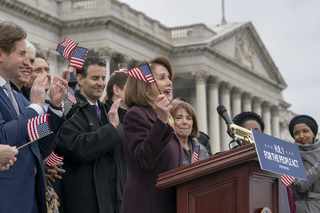After years spent impotently bemoaning the symptoms of Citizens United v. FEC,congressional Democrats may have finally settled on a treatment. In March, the House of Representatives passed H.R. 1, a sweeping democracy reform bill that includes two promising campaign finance measures. One would provide a six-to-one match for donations up to $200 to candidates for federal office who swear off bigger contributions and raise the first $50,000 on their own. The other would create a pilot program in which the government would give each voter who wants one a $25 voucher to donate to their preferred candidate.
These new-generation proposals are examples of so-called “level-up” campaign finance reform. They are designed to counter the power of big money not by pushing down on the super-rich, but by boosting everyone else. In 2018, for example, only 0.47 percent of Americans donated more than $200 to candidates, parties, or PACs, according to the Center for Responsive Politics. The money they gave, however, accounted for nearly three-quarters of all individual contributions. This leads to what the legal scholar Lawrence Lessig, a prominent supporter of the voucher idea, calls “dependence corruption,” in which politicians overwhelmingly cater to the tiny subset of wealthy funders on whom they rely. Spending limits may reduce the overall amount of money in play, but they don't do much to shift where the bulk of it comes from. Level-up reforms might.
Read Full Article »



